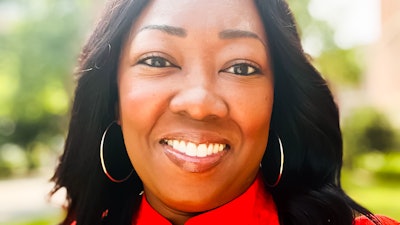When Adrianne Washington, dean of special academic programs at the Community College of Baltimore County (CCBC), found that the Honors Program was overlooking the school’s Black men, it didn’t sit right with her.
 Adrianne Washington
Adrianne Washington
“Especially as a minority woman, how can I say that I'm successful if there are students who look like me who feel like a program that I'm leading isn't a space for them?" she asks.
What followed was her pursuit to recruit and empower African American men as part of the Honors Program’s comprehensive transformation into a full-fledged Honors College.
Over the 15 years she’s been at CCBC, Washington’s roles and responsibilities have vastly expanded. Her time there has seen her teach social science and study abroad courses, head CCBC’s Honors Program as lead director, and become the school’s dean of special academic programs, all while keeping her work “student-centered.” Outside of CCBC, she has taught at Prince George's Community College and built online classes for the Peabody Institute, Johns Hopkins University’s music and dance conservatory.
Washington is dean of the nascent Honors College. In this role, she is looking at proportionate demographic representation between the program and CCBC at large; diversity in the classroom in terms of race, ethnicity, and age; and concepts of how students can give back to the community.
Washington says she wants the Honors Program to cater to the demographics of a community college. “A lot of institutions focus on full-time students, not part-time students, not non-traditional students,” she says. “One of the things that's really great about our program is that it was created intentionally for community college students and keeping non-traditional and part-time students in mind."
There are ways that community colleges can innovate on the Honors College formula, she says, such as offering evening and remote synchronous courses.
“It's thinking about how we can really meet students where they are,” says Washington. “We really have to be flexible. Don't really be afraid to get innovative [and] push back against this traditional view of honors education.”
CBCC’s Honors Program’s development into a college will come with a host of upgrades, including more experiential learning, research opportunities, lecture series, and the offering of merit scholarships.
Washington says she has been working to get the community college’s minority men into the Honors College. Contrary to how people commonly discuss Black men at CCBC — talks of how they are underperforming and of what they don’t do — the data show a different reality. About 40% of African American males on campus have above a 3.0 grade point average, says Dr. Sunni Solomon, the inaugural director of CCBC’s Male Student Success Initiative (MSSI). They are a student population that’s not been thought of much for Honors. But through Washington’s deliberate and thoughtful effort to change that, she has proven herself a well-liked advocate, Solomon says.
“Previously, when things went on with Honors, when that population was discussed, ... our [MSSI] program and our students weren't considered,” Solomon says. “I think that's the shift that Adrianne took with it.”
MSSI now has “a seat at the table” when development of the Honors College is discussed. There has been targeted information sessions for MSSI students. And Washington, ardent supporter that she is, is dedicated to getting in front of them and introducing the Honors College herself, Solomon says. “You have someone that looks like you, a Black woman, standing in front of the class in this role as dean telling you that you are Honors material, you can be in the Honors College,” he says. “She uses her positionality and identity to make sure that our men feel welcome, that they feel like they have a voice, that they feel seen, and that they also receive direction on how to pursue this.”
Washington holds a Master of Social Work from the University of Maryland, Baltimore, and a bachelor’s degree in social work from Hood College. Dr. Rae Rosenthal, founder of the CCBC Honors Program and former lead Honors Program director, describes her colleague in an email as “an extraordinary teacher, administrator, and leader,” commending her creativity and ability to follow through with her visions.
Joshua Ackerman, an assistant professor of history who teaches in the Honors College, says Washington is “compassionate beyond measure” and praises her ability to really listen to what her students want.
The Honors College is in its pilot stage. “The reason that we're in the pilot phase right now is because I was very specific about my desire to survey the students and have focus groups with the students,” says Washington. “I wanted to know what they cherished about Honors and what some of their challenges were.
“If I can't meet students’ needs, then there is really no point in continuing to do this work,” she says.





















